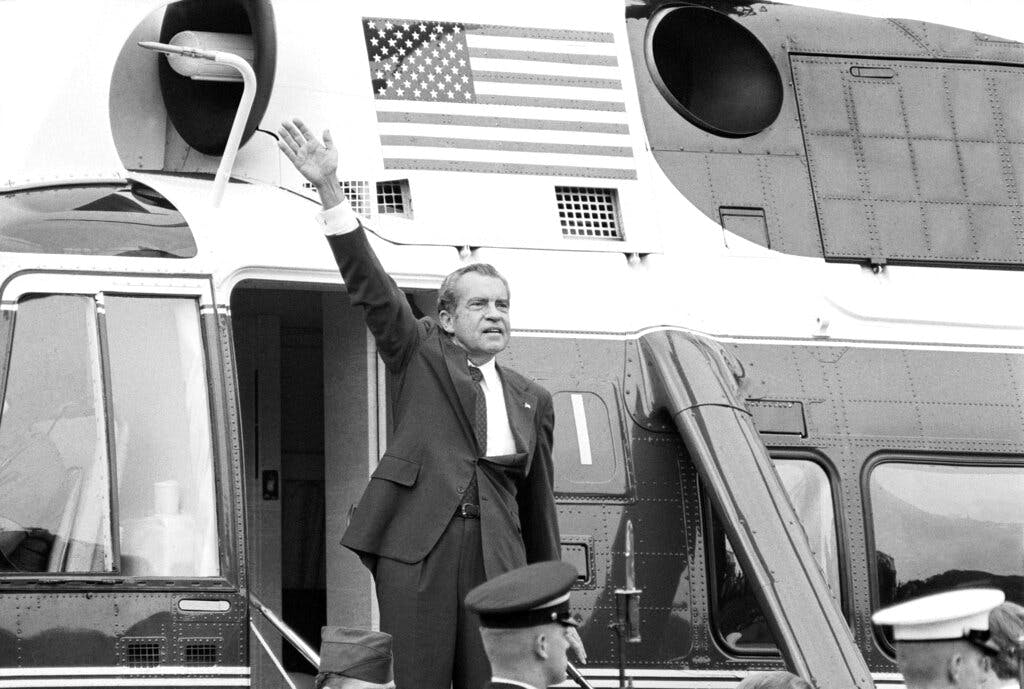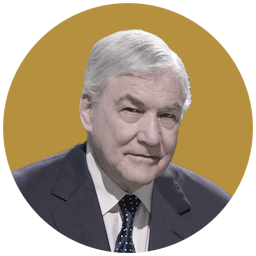Nixon, Fifty Years After Resigning, Is Rising in Historians’ Esteem, Earning Recognition as a Great President
His departure from office was the culmination of one of the most disgraceful episodes in American history.

The 50th anniversary of the retirement as president in mid-term of Richard Nixon is being marked this month. It is still celebrated in some quarters as a proud day in American history. It was the culmination of one of the most disgraceful episodes in American history: not because of President Nixon’s conduct, but because of the crucifixion of him by a rabid press, and the betrayal by most of his own party, just 21 months after he had led them to victory by the greatest plurality in the history of American elections, 18 million votes, a record that still stands despite the near doubling in the size of the electorate.
Throughout these 50 years, no conclusive evidence has come to light that Nixon had personally broken the laws. Undoubtedly some of his supporters did, but there is no evidence that he did. It is not disputed that he knew nothing about the forced entry of the Watergate office of the Democratic National Committee until he read about it in the newspapers. When the allegations against him that were voted out as legitimate counts for impeachment by the House judiciary committee are read today, they seem ludicrously inadequate as grounds for trying to turn a president out of office, and in any case as false charges.
He is accused of conspiring with many others to “delay, impede, and obstruct” the investigation, “cover up, protect, and conceal the existence and scope of the excavation,” that he “endeavored” to misuse the IRS, (not that he actually did so, like many other presidents before and since), and that he had violated his presidential oath. Nixon had a reasonable national security cover for what he himself ordered, invoked the usual dilatory procedures for a person under investigation, and in the end destroyed no evidence and handed over all that had been demanded, though he faced at all times a Kangaroo Court. The allegations, as they applied to Nixon, were a pious magnification of non-criminal conduct.
The little-remembered, and in the current ecological jargon, inconvenient truth, is that Nixon’s one full term in office was surpassed in American history, only by Abraham Lincoln’s, and by the first and third terms of Franklin Delano Roosevelt, as the most successful single term of any president in the history of the country. He was the first president since Zachary Taylor to be elected without his party controlling either house of the Congress, but despite that, he resolved practically all of the problems that were so prevalent at the time of his inauguration.
When he entered office, there were colossal demonstrations regularly against the American efforts in Vietnam. There were race riots and anti-war riots constantly for months on end throughout the country. The assassinations of Martin Luther King and Robert Kennedy and regular aircraft skyjackings shocked and demoralized the country.
There were 545,000 draftees in far-off Vietnam, with between 200 and 400 of them coming back every week in body bags; and ten months of negotiations with the North Vietnamese at Paris had barely achieved agreement on the shape of the negotiating table, and nothing else. There was no peace process in the Middle East. There was no relationship with Communist China, and there were no meaningful discussions in progress with the Soviet union.
Four years later, there were no riots or sky-jackings. America had almost completely evacuated Vietnam while maintaining a non-communist government at Saigon. In April, 1972, the South Vietnamese had defeated the North and Viet Cong with no American combat assistance, just heavy air support, and Nixon and his advisers reasoned that this could be done again when the North violated the peace agreements. Nixon had opened relations with the Peoples Republic of China, and triangulated superpower relations, had agreed on a formula to maintain peace in the Formosa Straits and democracy in Taiwan.
The deescalation of the Cold War had begun with the greatest arms control and reduction agreement in history (which also reestablished American nuclear superiority through the multiple-warhead intercontinental ballistic missiles). The Environmental Protection Agency had been founded; segregation had been ended throughout the country by local committees, acting efficiently, but discreetly.
The draft was ended after 30 years, and the crime rate was reduced significantly. Inflation was minimal, unemployment was low, and government borrowing, compared to subsequent decades, was modest. This remarkable array of indisputable achievements was the reason that the administration was re-elected with an unheard-of margin.
In 1974, there had only been one presidential impeachment in American history, and that had been in 1868 (Andrew Johnson) and was narrowly unsuccessful and completely unfounded. Nixon was a traditional American patriot who declined President Eisenhower’s advice to challenge the 1960 election result in which Nixon received more votes than John F. Kennedy, and many states were decided by extremely narrow margins.
If Illinois, Missouri, Nevada, and New Mexico flipped just 11,000 votes, Nixon would have been elected. He declined to challenge the election result because he thought that the United States would effectively be left without a government at a critical time in the Cold War. He believed that the national interest required that he accept the apparent results which she graciously did, and the same spirit motivated him to resign in 1974.
Nixon had made remarkable comebacks before in his career and he chose to attempt the greatest of all. He stated that he had made mistakes but had broken no laws, and he gradually rebuilt his career as a world-recognized authority on foreign and strategic relations. He lived on in good health and was highly active for 20 years and a number of his retirement addresses, such as that to the American Society of Newspaper Publishers in 1986, that galvanized a large section of informed foreign policy opinion.
He is gradually rising in historical esteem, even as the myth-makers who persecuted him continue to inflict themselves on us, wish for John Dean, Carl Bernstein, and Bob Woodward that they live long enough to be completely debunked and Nixon generally recognized as one of the country’s ten greatest presidents.

